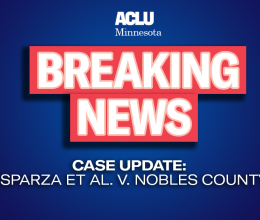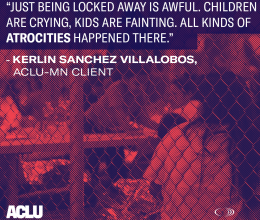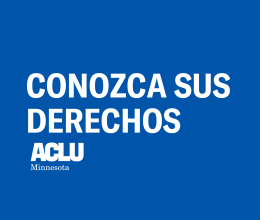ACLU-MN and 9 ACLU affiliates demand government documents regarding implementation of President Trump's Muslim bans
Case Background
The American Civil Liberties Union of Minnesota filed a Freedom of Information Act lawsuit together with the ACLUs of Illinois, Indiana, Iowa, Kentucky, Missouri, Nebraska, Ohio, South Dakota and Wisconsin demanding government documents about the implementation of President Trump's Muslim bans.
Today's action is part of a total of 13 FOIA lawsuits filed by ACLU affiliates across the country. The ACLU of Minnesota lawsuit is seeking records from U.S. Customs and Border Protection's Regional Field Office in Chicago, Illinois. In particular, the lawsuit seeks records related to CBP's implementation of President Trump's Muslim bans at Minneapolis St. Paul International Airport. In Minnesota, there has been very little information released about whether anyone has been detained or turned away.
The ACLU first sought this information through FOIA requests submitted to CBP on February 2. Since the government has failed to substantively respond, the ACLU is now suing.
"It is important that we know how people are being treated when they travel to Minnesota. Everyone should be treated respectfully and legally," stated ACLU-MN's Interim Legal Director John Gordon. "The Government is bound by law to release information about the treatment of people at the borders and we are very disappointed that we have to file a lawsuit in order to get access to it. Transparency of government action is important to ensure that everyone's rights are respected."
"CBP has a long history of ignoring its obligations under the federal Freedom of Information Act — a law that was enacted to ensure that Americans have timely access to information of pressing public concern. The public has a right to know how federal immigration officials have handled the implementation of the Muslim bans, especially after multiple federal courts have blocked various aspects of these executive orders," said Mitra Ebadolahi, Border Litigation Project Staff Attorney with the ACLU of San Diego and Imperial Counties.
Each lawsuit seeks unique and local information about CBP's implementation of the executive orders at specific airports and ports of entry in the midst of rapidly developing and sometimes conflicting government guidance.
The coordinated lawsuits seek information from the following CBP offices:
Atlanta
Baltimore
Boston
Chicago
Detroit
Houston
Los Angeles
Miami
Portland
San Diego
San Francisco
Seattle
Tampa
Tucson




